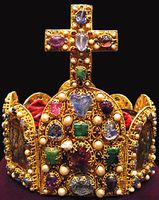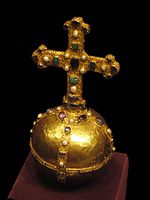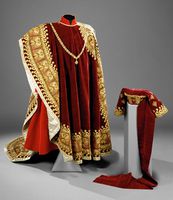Head of state (Batavia): Difference between revisions
No edit summary |
|||
| (23 intermediate revisions by 4 users not shown) | |||
| Line 1: | Line 1: | ||
{{Batavia Article}} | {{Batavia Article}} | ||
{{Prime Minister | |||
|title = Head of State | |||
|nation = Batavia | |||
|arms = File:KoninklijkwapenschildvanBatavie.png | |||
|caption = Coat of arms of Batavia | |||
|photo = File:FrederikAlfons01.jpg | |||
|name = [[Frederik Alfons des Vinandy]] | |||
|date = 1711 | |||
|style = His Majesty | |||
|residence = [[Blanckenhof Palace]] | |||
|appointer = Succession | |||
|term = Lifetime | |||
|first = [[Faya I]], ''Queen of Batavia'' | |||
|formed = 1514 | |||
}} | |||
[[File:Arkadius3.png|thumb|left|200px|The end of Arkadius III's reign (1578 - 1582 AN) meant the end of a relative period. It was the start of short-lived cabinets, internal fights and several kings, which would eventually weaken the country.]] | [[File:Arkadius3.png|thumb|left|200px|The end of Arkadius III's reign (1578 - 1582 AN) meant the end of a relative period. It was the start of short-lived cabinets, internal fights and several kings, which would eventually weaken the country.]] | ||
| Line 5: | Line 22: | ||
Between 1578 AN and 1669 AN, the title of '''King of Batavians''' was used to refer to the King. This change of tradition began under [[Arkadius III]], who - unlike his predecessors - sought popular support among the masses. This subtle hint was meant to show the people that he wasn't their master, but more as an equal (or even servant). In the end, it didn't help him when faced with a coup d'état, but his successors would keep the title. It was in 1669 AN, under [[Arkadius IV]], that these changes were reverted with support on the nobility and high dignitaries. | Between 1578 AN and 1669 AN, the title of '''King of Batavians''' was used to refer to the King. This change of tradition began under [[Arkadius III]], who - unlike his predecessors - sought popular support among the masses. This subtle hint was meant to show the people that he wasn't their master, but more as an equal (or even servant). In the end, it didn't help him when faced with a coup d'état, but his successors would keep the title. It was in 1669 AN, under [[Arkadius IV]], that these changes were reverted with support on the nobility and high dignitaries. | ||
As the Batavian Throne had become an office of high importance and influence throughout the years, several parties and factions fought for it: the [[Ultraroyalisten|Ultraroyalists]] supported the rise of a [[Ayreon-Kalirion|Kalirion]] to the Throne, the [[Radicalen]] were divided between Vinandists and Windsorists, while the syndicalists preferred the creation of a republic. To rally support from all sides, the office of '''Staatsholder''' (''Staatshouder'') was established with the ''[[Blanckenhof Accords]] of 1685''. Salome, who acted as Staatsholder, was eventually replaced by [[Hendrik V]] in 1691 AN, ending the short-lived personal union between Batavia and [[Shireroth]]. | |||
==Duties and priviliges== | ==Duties and priviliges== | ||
| Line 17: | Line 36: | ||
* Golden Fleece, a woolen robe made of the finest gold wire. It has been part of the regalia for many generations and was in the possession of the Royal Family which once ruled the Kingdom of 's Koningenwaarde, before it united the territories into one country. Made with the gold of the mines to the east of Bosdaal and fabricated by crafstmen from all across the country. | * Golden Fleece, a woolen robe made of the finest gold wire. It has been part of the regalia for many generations and was in the possession of the Royal Family which once ruled the Kingdom of 's Koningenwaarde, before it united the territories into one country. Made with the gold of the mines to the east of Bosdaal and fabricated by crafstmen from all across the country. | ||
The regalia can be viewed at the [[Koninklijk Paleis]] of [['s Koningenwaarde]] in the Edelenzaal. | |||
<gallery widths="200" heights="200"> | <gallery widths="200" heights="200"> | ||
| Line 28: | Line 48: | ||
===Kings of 's Koningenwaarde=== | ===Kings of 's Koningenwaarde=== | ||
The Kings of 's Koningenwaarde preceded the birth of a strong and centralised Kingdom. While, from a certain moment, more or less uniting the Batavians into a framework of loose cooperation and loyalty to the Crown, there was no political unity. | The Kings of 's Koningenwaarde preceded the birth of a strong and centralised Kingdom. While, from a certain moment, more or less uniting the Batavians into a framework of loose cooperation and loyalty to the Crown, there was no political unity. | ||
#[[Jan I]]: 304 - 328 AN | |||
#[[Jan II]]: 328 - 342 AN | |||
#[[Alfred I (Batavia)|Alfred I]]: 342 - 356 AN | |||
#[[Edward I (Batavia)|Edward I]]: 356 - 357 AN | |||
#[[Donald I]]: 357 - 372 AN | |||
#[[Alfred II]]: 372 - 387 AN | |||
#[[Donald II]]: 387 - 404 AN | |||
#Anna I | |||
#Jan III | |||
#Jacobus I | |||
#Eduard II | |||
#Mathilde | |||
#Jacobus II | |||
#Jacobus III | |||
#Donald III | |||
#Alfred III | |||
#Anna II | |||
#Jacobus IV | |||
#Hendrik I | |||
#Alfred IV | |||
#Richard | |||
#Hendrik II | |||
#Jacobus V | |||
#Hendrik III | |||
#Alfred V | |||
#Gemma | |||
#Harald I | |||
#Harald II | |||
#Robert I | |||
#Jan IV | |||
#Alfred VI | |||
#Robert II | |||
#Frederick I | |||
#Alfons I: 1127 - ... | |||
===Kings of the Batavian Lands=== | |||
Starting with Alfons the First of the House of Veronique, a loose confederation of lordships was established under the Kings of 's Koningenwaarde. The defeat of the Duke of Davignon, Johan Windsor, in the [[Battle of Irrel]] (of 1142 AN) meant the end of Dietish defiance to the Crown. The ''county of Vinandy'' (and with them the nobility of the ''Confederation of Ingelburg''), the lordships of ''Transingel'' all bent the knee and - with support of the Church - recognised the position of the King as suzerain. | |||
#Alfons I: 1142 - 1177 AN | |||
#Julia I: 1177 - 1191 AN | |||
#Ferdinand I: 1191 - 1206 AN | |||
#Leopold I: 1206 - 1228 AN | |||
#Sueen-Regent Victoria: 1228 - 1237 AN | |||
#Leopold II: 1237 - 1241 AN | |||
##Jacob of Austrasia (Batavian Republic): 1241 - 1248 AN | |||
##Jacobus of Austrasia (Batavian Republic): 1248 - 1250 AN | |||
#Alfons II: 1250 - 1257 AN | |||
#Willem I: 1257 - 1293 AN | |||
#Ferdinand II: 1293 - 1294 AN | |||
#Wilhelma I: 1294 - 1305 AN | |||
#Willem II: 1305 - 1337 AN | |||
#Willem III: 1337 - 1361 AN | |||
#Albert I: 1361 - 1398 AN | |||
#Adelina I: 1398 - 1413 AN | |||
#Willem IV: 1413 - 1432 AN | |||
#Karel I: 1432 - 1470 AN | |||
#Karel II: 1470 - 1514 AN | |||
===Kings of Batavia=== | ===Kings of Batavia=== | ||
| Line 39: | Line 116: | ||
! scope="col" | Regnal name | ! scope="col" | Regnal name | ||
! scope="col" | Dynasty | ! scope="col" | Dynasty | ||
! scope="col" | | ! scope="col" | Date of birth (in AN) | ||
! scope="col" | Reign (in AN) | ! scope="col" | Reign (in AN) | ||
! scope="col" | | ! scope="col" | Date of death (in AN) | ||
! scope="col" | Notes | ! scope="col" | Notes | ||
|- | |- | ||
| Line 64: | Line 141: | ||
<small>(''4 september 2006 - 2 december 2006'')</small> | <small>(''4 september 2006 - 2 december 2006'')</small> | ||
|| 1565 | || 1565 | ||
|| | || | ||
*Became suddenly ill and despite good care, he died on 7 Zomermaand 1565 AN. | |||
*In 1523 AN, revolutionaries proclaimed the [[Davignonrepublic]]. The rebellion was crushed, and Arkadius was succeeded by Arkadius the Second in 1524. | |||
|- | |- | ||
| 19 | | 19 | ||
||[[File:Arkadius II van Batavie.jpg|100x150px]] | ||[[File:Arkadius II van Batavie.jpg|100x150px]] | ||
| Line 104: | Line 171: | ||
| 20 | | 20 | ||
|| [[File:Franzi-Ferdinanda.png|100x150px]] | || [[File:Franzi-Ferdinanda.png|100x150px]] | ||
|| [[File: | || [[File:Wapenschild Franzi-Ferdinanda.png|100px]] | ||
|| [[Fränzi-Ferdinanda|Fränzi-Ferdinanda I]] | || [[Fränzi-Ferdinanda|Fränzi-Ferdinanda I]] | ||
|| [[House of Vinandy-Windsor]] | || [[House of Vinandy-Windsor]] | ||
| Line 176: | Line 243: | ||
||[[File:Hendrik I.jpg|100x150px]] | ||[[File:Hendrik I.jpg|100x150px]] | ||
|| [[File:Wapenschildvanvinandy.png|100px]] | || [[File:Wapenschildvanvinandy.png|100px]] | ||
|| [[Hendrik | || [[Hendrik IV]] | ||
|| [[House of Vinandy]] | || [[House of Vinandy]] | ||
|| 1576 | || 1576 | ||
| Line 185: | Line 252: | ||
| 26 | | 26 | ||
||[[File: | ||[[File:Feixing.png|100x150px]] | ||
|| [[File:WapenErasmus.png|100px]] | || [[File:WapenErasmus.png|100px]] | ||
|| [[Sisera I]] | || [[Sisera I]] | ||
|| [[House Erasmus]] | || [[House Erasmus]] | ||
|| | || 1576 | ||
|| 1600 - 1602 | || 1600 - 1602 | ||
|| | || | ||
| Line 207: | Line 274: | ||
| 28 | | 28 | ||
||[[File: | ||[[File:Erlkonig.png|100x150px]] | ||
|| [[File:WapenErasmus.png|100px]] | || [[File:WapenErasmus.png|100px]] | ||
|| [[Goburin Emperor|Simon I]] | || [[Goburin Emperor|Simon I]] | ||
|| [[House Erasmus]] | || [[House Erasmus]] | ||
|| | || 1596 | ||
|| 1614 - 1623 | || 1614 - 1623 | ||
|| | || | ||
| Line 217: | Line 284: | ||
|- | |- | ||
| 29 | | 29 | ||
||[[File: | ||[[File:Haigui.png|100x150px]] | ||
|| [[File:WapenErasmus.png|100px]] | || [[File:WapenErasmus.png|100px]] | ||
|| Sisera II | || Sisera II | ||
| Line 227: | Line 294: | ||
|- | |- | ||
| 30 | | 30 | ||
||[[File: | ||[[File:Dashi.png|100x150px]] | ||
|| [[File:WapenErasmus.png|100px]] | || [[File:WapenErasmus.png|100px]] | ||
|| Mordechai II | || Mordechai II | ||
| Line 233: | Line 300: | ||
|| | || | ||
|| 1627 - 1631 | || 1627 - 1631 | ||
|| | || 1631 | ||
|| | || | ||
|- | |- | ||
| 31 | | 31 | ||
||[[File:Gradus | ||[[File:Gradus Erasmus.jpg|100x150px]] | ||
|| [[File:WapenErasmus.png|100px]] | || [[File:WapenErasmus.png|100px]] | ||
|| Gradus I | || Gradus I | ||
| Line 257: | Line 324: | ||
|- | |- | ||
| 33 | | 33 | ||
||[[File: | ||[[File:Danya Emperor.png|100x150px]] | ||
|| [[File:WapenErasmus.png|100px]] | || [[File:WapenErasmus.png|100px]] | ||
|| Simon II | || Simon II | ||
| Line 270: | Line 337: | ||
| 34 | | 34 | ||
||[[File:Arkadius IV.png|100x150px]] | ||[[File:Arkadius IV.png|100x150px]] | ||
|| [[File: | || [[File:Vinandygroot.png|100px]] | ||
|| [[Arkadius IV]] | || [[Arkadius IV]] | ||
|| [[House of Vinandy]] | || [[House of Vinandy]] | ||
|| 1642 | || 1642 | ||
|| 1669 - ''present'' | || 1669 - 1685 | ||
|| 1703 | |||
|| | |||
|- | |||
| - | |||
||[[File:Joseph Bartholomeus Windsor.png|100x150px]] | |||
|| [[File:Wapenwindsor.png|100px]] | |||
|| ''Regency by'' [[Joseph Bartholomeus des Vinandy-Windsor]] | |||
|| [[House of Vinandy-Windsor]] | |||
|| 1611 | |||
|| 1685 - 1686 | |||
|| | |||
|| | |||
|- | |||
| - | |||
||[[File:Salome.1688.png|100x150px]] | |||
|| [[File:Arms_Ayreon-Kalirion10.png|100px]] | |||
|| ''Regency by'' [[Salome Ylva Octavia]] as ''Stathouder'' | |||
|| [[House of Ayreon-Kalirion]] | |||
|| 17.VII.1665 | |||
|| 1686 - 1691 | |||
|| | |||
|| Personal union between Shireroth and Batavia. Hailed as an important stabilising factor during a troublesome time. Reattachment of [[Kasterburg]] to the Kingdom during her reign. | |||
|- | |||
| 35 | |||
||[[File:Hendrik V of Batavia.png|100x150px]] | |||
|| [[File:Vinandygroot.png|100px]] | |||
|| [[Hendrik Leopold des Vinandy|Hendrik V]] | |||
|| [[House of Vinandy]] | |||
|| 1645 | |||
|| 1691 - 1711 | |||
|| | |||
|| | |||
|- | |||
| 36 | |||
||[[File:FrederikAlfons01.jpg|100x150px]] | |||
|| [[File:Vinandygroot.png|100px]] | |||
|| [[Frederik Alfons des Vinandy|Frederik II]] | |||
|| House of Vinandy-Paravel | |||
|| 1688 | |||
|| 1711 - ''present'' | |||
|| | || | ||
|| | || | ||
|- | |- | ||
|} | |} | ||
[[category:Batavia]] | [[category:Batavia]] | ||
Latest revision as of 23:47, 21 July 2024
| Head of State of Batavia | |
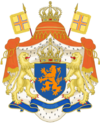
| |
| Coat of arms of Batavia | |

| |
| Incumbent | |
| Frederik Alfons des Vinandy | |
| since 1711 | |
| Style | His Majesty |
| Residence | Blanckenhof Palace |
| Appointer | Succession |
| Term | Lifetime |
| Inaugural holder | Faya I, Queen of Batavia |
| Formation | 1514 |
The King of Batavia is the head of state of the Kingdom of Batavia. When a female ascends the Throne, she receives the title Queen of Batavia. The King does not only serve as head of state but is the figurehead of the Batavian Catologian Church, the chairman of the Hogerhuis and supreme commander of the armed forces, the Bataafse Strijdkrachten.
Between 1578 AN and 1669 AN, the title of King of Batavians was used to refer to the King. This change of tradition began under Arkadius III, who - unlike his predecessors - sought popular support among the masses. This subtle hint was meant to show the people that he wasn't their master, but more as an equal (or even servant). In the end, it didn't help him when faced with a coup d'état, but his successors would keep the title. It was in 1669 AN, under Arkadius IV, that these changes were reverted with support on the nobility and high dignitaries.
As the Batavian Throne had become an office of high importance and influence throughout the years, several parties and factions fought for it: the Ultraroyalists supported the rise of a Kalirion to the Throne, the Radicalen were divided between Vinandists and Windsorists, while the syndicalists preferred the creation of a republic. To rally support from all sides, the office of Staatsholder (Staatshouder) was established with the Blanckenhof Accords of 1685. Salome, who acted as Staatsholder, was eventually replaced by Hendrik V in 1691 AN, ending the short-lived personal union between Batavia and Shireroth.
Duties and priviliges
Regalia and crown jewels
On the day of the throne, the king or queen is dressed with the regalia and crown jewels:
- Willemian crown, as a symbol of the sovereignty of the Kingdom of Batavia and the dignity of the King as head of state. The crown forged on behalf of good King William the Second, which serves as a symbol of dignity.
- Globe, symbolises Royal power, both worldly as spiritually, as King over Micras and the Batavian Kingdom.
- Scepter, symbolises justice, and the King as highest shepherd and judge of the nation.
- Golden Fleece, a woolen robe made of the finest gold wire. It has been part of the regalia for many generations and was in the possession of the Royal Family which once ruled the Kingdom of 's Koningenwaarde, before it united the territories into one country. Made with the gold of the mines to the east of Bosdaal and fabricated by crafstmen from all across the country.
The regalia can be viewed at the Koninklijk Paleis of 's Koningenwaarde in the Edelenzaal.
List of monarchs
Kings of 's Koningenwaarde
The Kings of 's Koningenwaarde preceded the birth of a strong and centralised Kingdom. While, from a certain moment, more or less uniting the Batavians into a framework of loose cooperation and loyalty to the Crown, there was no political unity.
- Jan I: 304 - 328 AN
- Jan II: 328 - 342 AN
- Alfred I: 342 - 356 AN
- Edward I: 356 - 357 AN
- Donald I: 357 - 372 AN
- Alfred II: 372 - 387 AN
- Donald II: 387 - 404 AN
- Anna I
- Jan III
- Jacobus I
- Eduard II
- Mathilde
- Jacobus II
- Jacobus III
- Donald III
- Alfred III
- Anna II
- Jacobus IV
- Hendrik I
- Alfred IV
- Richard
- Hendrik II
- Jacobus V
- Hendrik III
- Alfred V
- Gemma
- Harald I
- Harald II
- Robert I
- Jan IV
- Alfred VI
- Robert II
- Frederick I
- Alfons I: 1127 - ...
Kings of the Batavian Lands
Starting with Alfons the First of the House of Veronique, a loose confederation of lordships was established under the Kings of 's Koningenwaarde. The defeat of the Duke of Davignon, Johan Windsor, in the Battle of Irrel (of 1142 AN) meant the end of Dietish defiance to the Crown. The county of Vinandy (and with them the nobility of the Confederation of Ingelburg), the lordships of Transingel all bent the knee and - with support of the Church - recognised the position of the King as suzerain.
- Alfons I: 1142 - 1177 AN
- Julia I: 1177 - 1191 AN
- Ferdinand I: 1191 - 1206 AN
- Leopold I: 1206 - 1228 AN
- Sueen-Regent Victoria: 1228 - 1237 AN
- Leopold II: 1237 - 1241 AN
- Jacob of Austrasia (Batavian Republic): 1241 - 1248 AN
- Jacobus of Austrasia (Batavian Republic): 1248 - 1250 AN
- Alfons II: 1250 - 1257 AN
- Willem I: 1257 - 1293 AN
- Ferdinand II: 1293 - 1294 AN
- Wilhelma I: 1294 - 1305 AN
- Willem II: 1305 - 1337 AN
- Willem III: 1337 - 1361 AN
- Albert I: 1361 - 1398 AN
- Adelina I: 1398 - 1413 AN
- Willem IV: 1413 - 1432 AN
- Karel I: 1432 - 1470 AN
- Karel II: 1470 - 1514 AN
Kings of Batavia
The several principalities, duchies and counties were eventually united in a centralised state under the leadership of the Regent Jodocus van Haltna. Batavia would transform from a union of States into a centralised monarchy. The First Kingdom would see the struggle between the absolutists (who sought to stop the parliament from taking to much power) and the more radical democrats. This would eventually led to the end of Arkadius I's short-lived reign and the ascension of his brother onto the Throne.
| No. | Portrait | Coat of arms | Regnal name | Dynasty | Date of birth (in AN) | Reign (in AN) | Date of death (in AN) | Notes |
|---|---|---|---|---|---|---|---|---|
| 17 | 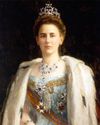
|
Faya I | House Veronique | 1462 | 1514 - 1520
(22 march 2006 - 4 september 2006) |
1520 | ||
| 18 | 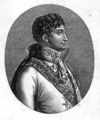
|

|
Arkadius I | House of Vinandy | 1502 | 1520 - 1523 / 1524
(4 september 2006 - 2 december 2006) |
1565 |
|
| 19 | 
|
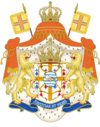
|
Arkadius II | House of Vinandy | 1506 | 1524 - 1567
(4 january 2007 - 18 august 2010) |
1567 | |
| - | 
|
First regency of Jeroen van Veen | 1567 - 1568
(18 august - 13 september 2010) |
|||||
| 20 | 
|

|
Fränzi-Ferdinanda I | House of Vinandy-Windsor | 1552 | 1568 - 1577
(13 september 2010 - 18 june 2011) |
1577 | Abdicated in favor of Antonius Frederik Karel (Arkadius III des Vinandy). |
| - | 
|
Second regency of Jeroen van Veen | 1577 - 1578
(18 june - 6 july 2011) |
|||||
| 21 | 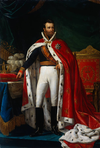
|

|
Arkadius III | House of Vinandy | 1552 | 1578 - 1582 / 1585
(6 july 2011 - 12 november 2011) |
1634 | Not all sources refer to the end of his reign with the same year: some recognise 1582 AN, when Arkadius stepped down under pressure of the armed forces, while others recognise the adoption of a new constitution and the ascension of Mordechai I as official date. |
| 22 | 
|

|
Mordechai I | House Erasmus | 1585 - 1588 | |||
| 23 | 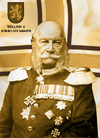
|
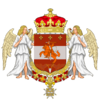
|
Willem V | House of Vinandy-Windsor | 1576 | 1588 - 1592 | 1592 | |
| 24 | 
|
File:WapenBunthe-une.png | Maximiliaan I | House van Bunthe-Uné | 1592 - 1594 | |||
| 25 | 
|

|
Hendrik IV | House of Vinandy | 1576 | 1594 - 1600 | 1603 | |
| 26 | 
|

|
Sisera I | House Erasmus | 1576 | 1600 - 1602 | ||
| 27 | 
|

|
Anna III | House of Vinandy-Windsor | 1602 - 1614 | |||
| 28 | 
|

|
Simon I | House Erasmus | 1596 | 1614 - 1623 | First Heavenly Light of Jingdao who claimed and combined the title of King of Batavians with his emperorship. Start of the Jingdaoese-Batavian Kings. | |
| 29 | 
|

|
Sisera II | House Erasmus | 1623 - 1627 | |||
| 30 | 
|

|
Mordechai II | House Erasmus | 1627 - 1631 | 1631 | ||
| 31 | 
|

|
Gradus I | House Erasmus | 1631 - 1634 | |||
| 32 | 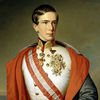
|

|
Heinrich I | House Erasmus | 1631 - 1636 | |||
| 33 | 
|

|
Simon II | House Erasmus | 1636 - 1640 | |||
| 34 | 
|

|
Arkadius IV | House of Vinandy | 1642 | 1669 - 1685 | 1703 | |
| - | 
|

|
Regency by Joseph Bartholomeus des Vinandy-Windsor | House of Vinandy-Windsor | 1611 | 1685 - 1686 | ||
| - | 
|

|
Regency by Salome Ylva Octavia as Stathouder | House of Ayreon-Kalirion | 17.VII.1665 | 1686 - 1691 | Personal union between Shireroth and Batavia. Hailed as an important stabilising factor during a troublesome time. Reattachment of Kasterburg to the Kingdom during her reign. | |
| 35 | 
|

|
Hendrik V | House of Vinandy | 1645 | 1691 - 1711 | ||
| 36 | 
|

|
Frederik II | House of Vinandy-Paravel | 1688 | 1711 - present |

